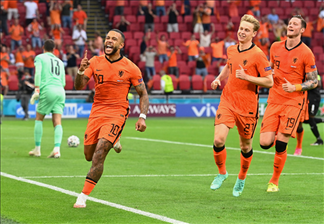According to CCTV5 program list (December 29, 2023), the European Football Championship (European Cup for short) is a national team event hosted by the European Football Association Union (UEFA for short). It is held every four years and is the highest honor of European football. The 2024 European Cup will be held on June 11 next year
According to CCTV5 program list (December 29, 2023), the European Football Championship (European Cup for short) is a national team event hosted by the European Football Association Union (UEFA for short). It is held every four years and is the highest honor of European football. The 2024 European Cup will be held in 13 cities of 13 European countries from June 11 to July 11 next year, which is the first event held across multiple countries in the history of the European Cup. What's more, the number of teams in the final circle of this European Cup will be expanded from 16 to 24. What does this mean?
First of all, this means that the teams participating in the European Cup will be more diversified, and more countries and regions will have the opportunity to step on the stage of the European Cup to show their style. According to the regulations of UEFA, the teams participating in the 2024 European Cup will be composed of the following parts: 11 of the 13 host countries (Germany, England, Spain, Italy, the Netherlands, Belgium, Russia, Scotland, Ireland, Denmark and Hungary) will be directly promoted to the finals, and the other two (Azerbaijan and Romania) will participate in the qualifiers; The preliminaries will be attended by the remaining 44 UEFA Member States and will be divided into nine groups. The first two of each group will directly advance to the final circle, and the third of each group will enter the play off. The four winners of the play off will win the last four seats in the final circle. In this way, there will be 24 teams in the final circle of the European Cup, which will be divided into 6 groups with 4 teams in each group. After the group game, the top two teams in each group and the fourth best team in each group will enter the knockout phase until the champion is determined.

Secondly, this means that the schedule of the European Cup will be more tense, and more games will bring more highlights to the fans. According to the arrangement of UEFA, there will be 51 matches in the final circle of the 2024 European Cup, 20 more than the original 31 matches, and the game time will also be extended from the original 23 days to 31 days, with an average of 1.6 matches per day. This will be a physical, technical and tactical test for the participating teams. They need to adjust their state in a short time to deal with different opponents and environments. This will be a visual and psychological feast for fans, who can enjoy more high-level confrontation and witness more surprises and sorrows.
Finally, this means that the competition for the European Cup will be more intense, more teams will have the opportunity to fight for the championship, and there will also be more variables and uncertainties. According to the statistics of UEFA, since the European Cup was held in 1960, a total of 10 countries have won the championship, including Germany and Spain three times each, France twice, the Soviet Union, Italy, Czechoslovakia, the Netherlands, Denmark, Greece and Portugal once each. Before the expansion of the army, the championship of the European Cup was basically contested by the traditional strong teams, and it was often the first place in the group match. However, after the expansion, there may be more dark horses in the European Cup champion, and they are often the second or third place in the group match. For example, in the European Cup 2016, Portugal, as the third place in the group match, won their first European Cup championship by defeating the host France in the final. Such a story may be repeated in the 2024 European Cup.
The following is the data of previous European Cup champions for your reference:
| particular year |
champion |
runner-up |
Third place |
rearguard |
| one thousand nine hundred and sixty |
Soviet Union |
Yugoslavia |
Czechoslovakia |
France |
| one thousand nine hundred and sixty-four |
Spain |
Soviet Union |
Hungary |
Denmark |
| one thousand nine hundred and sixty-eight |
Italy |
Yugoslavia |
England |
Soviet Union |
| one thousand nine hundred and seventy-two |
West Germany |
Soviet Union |
Belgium |
Hungary |
| one thousand nine hundred and seventy-six |
Czechoslovakia |
West Germany |
Netherlands |
Yugoslavia |
| one thousand nine hundred and eighty |
West Germany |
Belgium |
Czechoslovakia |
Italy |
| one thousand nine hundred and eighty-four |
France |
Spain |
Denmark |
Portugal |
| one thousand nine hundred and eighty-eight |
Netherlands |
Soviet Union |
Italy |
West Germany |
| one thousand nine hundred and ninety-two |
Denmark |
Germany |
Netherlands |
Sweden |
| one thousand nine hundred and ninety-six |
Germany |
Czech Republic |
England |
France |











